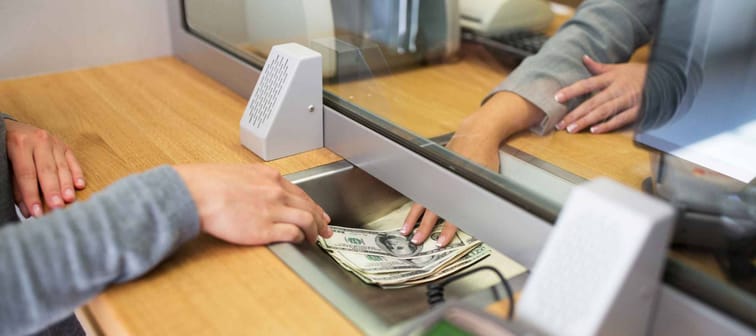How do payday loans work?
Payday loans are quick and easy. You can get cash in as little as 15 minutes by applying in person at a storefront location or by the following day if you apply online. The lender will just need to confirm your ID, income and bank account information.
They’ll also require a post-dated check for the amount you’ve borrowed plus a bit more to pay for the service. The check will be dated to the day you get paid at work, normally within a two-week timeframe. Or you might have to provide the lender with authorization to directly withdraw money from your bank account.
The process is simple, but there’s no guarantee that applicants will be approved for the loan. You might be rejected if:
- You don’t make enough money: Typically, lenders require at least $500 in monthly net income to be considered.
- You’re active-duty military: Federal law states that the most you can charge military members is an annual percentage rate (APR) of 36%, so many payday lenders avoid them.
- You have a recent bankruptcy.
- You haven’t been employed for very long.
- Your bank account was opened too recently.
- You have recently bounced checks.
Because payday loans are geared toward people with poor credit, the application process doesn't involve a credit check and your borrowing record usually isn't reported to the national credit bureaus. That means taking out or repaying a payday loan probably won't hurt or help your credit scores.
The amount you can borrow on a payday loan is almost always less than $1,000. The exact limit depends on your state — some don’t even allow payday loans — and your financial situation. Where payday loans are permitted, the amount is usually limited to between $300 and $1,000. Your personal limit will be at the lender's discretion.
Kiss Your Credit Card Debt Goodbye
Having a single loan to pay off makes it easier to manage your payments, and you can often get a better interest rate than what you might be paying on credit cards and car loans.
Fiona is an online marketplace offering personalized loan options based on your unique financial situation.
When you consolidate your debt with a personal loan, you can roll your payments into one monthly installment. Find a lower interest rate and pay down your debt faster today.
Get StartedDo payday loans have high fees?
To get a loan from a storefront lender, you can expect to pay $15 to $30 for every $100 you borrow, according to the Consumer Financial Protection Bureau (CFPB). A fee of $15 equates to an APR of almost 400% for a two-week loan.
And that’s on the low end. Borrowers in Texas, Utah, Nevada and Idaho pay more than 650% interest on a typical payday loan, according to the Center for Responsible Lending. Some online payday lenders charge even higher rates by claiming exemption from state rate caps.
By comparison, APRs on credit cards typically sit between 13% and 25%.
The astronomical interest rates are being charged to the people who can least afford it, making payday loans easy to get into but difficult to get out of. People who desperately need $500 now will probably find it difficult to repay $575 two weeks later.
In some states, people struggling with their payments are allowed to renew or roll over their loan into a new one, but that leads to higher and higher fees — creating a kind of debt spiral for people of limited means. The CFPB says 80% of payday loans get rolled over or reborrowed within 30 days.
If the loan isn’t repaid on time, the lender will try to withdraw money directly from your bank account. If you don’t have enough money in your account, each failed attempt may trigger additional bank fees for you.
But payday lenders won’t stop there. Be prepared for relentless calls (to you and your family) and letters from lawyers. They might even outsource your debt to an even more tenacious debt collector.
Why do people still take out payday loans?
Even with such poor terms, payday loans remain popular: 12 million Americans use them every year (while spending $9 billion on fees).
People with bad credit and no savings are natural customers for payday lenders. According to a 2020 survey from the First National Bank of Omaha, nearly half of U.S. adults say they expect to be living paycheck-to-paycheck in 2020. And 53% say they don’t have an emergency fund that could cover three months of expenses.
That was before COVID-19 lockdowns led to some of the worst unemployment the U.S. has ever seen.
Low-wage workers can often manage daily expenses, but if an emergency hits — like a medical bill or car trouble — they need money fast.
Borrowers who've been thrown out of financial equilibrium and need instant access to cash often have bigger things to worry about than the loans' high price tags. But payday loans rarely work out well for consumers — and there are plenty of alternatives.
Meet Your Retirement Goals Effortlessly
The road to retirement may seem long, but with WiserAdvisor, you can find a trusted partner to guide you every step of the way
WiserAdvisor matches you with vetted financial advisors that offer personalized advice to help you to make the right choices, invest wisely, and secure the retirement you've always dreamed of. Start planning early, and get your retirement mapped out today.
Get Started4 alternatives to payday loans
Consumers with sufficient credit can turn to credit cards or, better yet, take out a personal loan.
Personal loan rates often start as low as 6% APR and can range up to 36%. In most cases, you’ll have two to five years to pay it back in monthly installments at a fixed, simple interest rate. Payments will be the same every month for the life of the loan.
You should exhaust every other opportunity before taking out a payday loan, including:
- Borrowing from friends and family.
- Asking your employer to advance your paycheck.
- Selling things you don’t desperately need.
- Taking up a side hustle to earn extra cash.
Build your credit and savings
If you’ve ever used a payday loan, you’re likely trying hard to avoid them in the future.
The key is improving your credit score, which will allow you to access loans with better interest rates. The best way to do that is to pay down as much debt as possible and establish a record of prompt payment.
Borrowers who have already racked up debt from multiple sources will want to look into a consolidation loan. By taking out a single, low-interest personal loan, you can pay off all of your high-interest debt at once, saving you money and helping you free yourself much quicker.
If you have bad credit or no credit, you might need to start off by getting a secured credit card or a credit builder loan. These unusual products help people establish a history of responsible borrowing and raise their credit scores so they can get normal credit cards and loans.
Finally, you’ll want to get to work building your emergency fund so won’t have to borrow money in a pinch. Try to identify ways to cut your expenses and stash your excess money in a high-yield savings account, which will help your money grow while you aren’t using it.
Once your finances are back on solid ground, you can put payday loans behind you for good.
Sponsored
This Company Will Help Nearly Anyone Get Rid of Credit Card Debt
Do you feel like paying off your credit card is a constant grind, with no end in sight? You’re not alone. A personal loan offers lower interest rates and fixed payments, making it a smart choice to consolidate high-interest credit card debt. It helps save money, simplifies payments, and accelerates debt payoff.
Fiona is a free online service that shows you the best lending options to pay off your credit card debt fast — and save a ton in interest.








